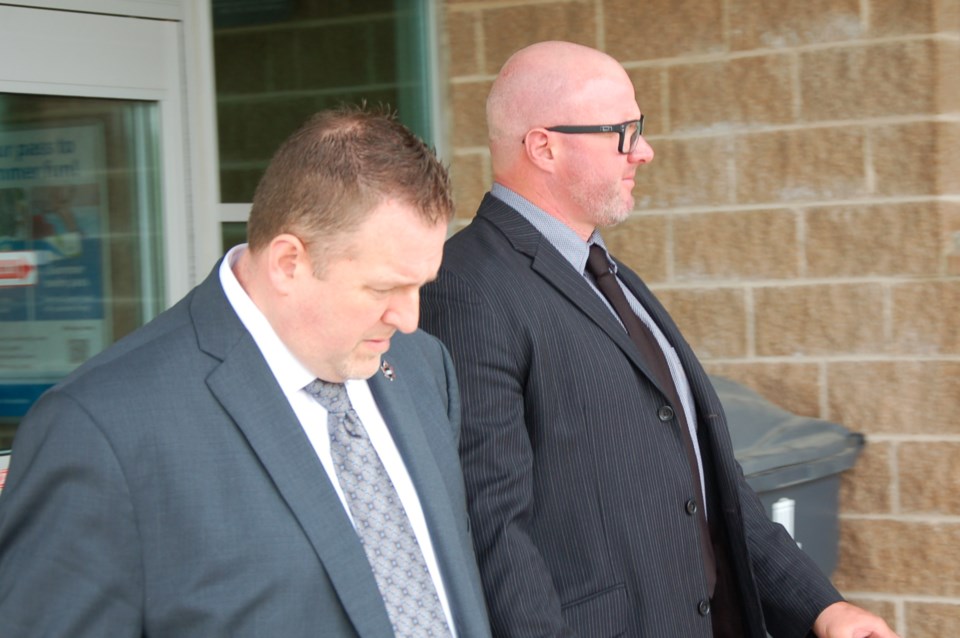Twice convicted of assault related to his on-duty actions, Const. Corey McArthur is of “no further use” to Guelph police and should be dismissed, the service’s lawyer said during Friday’s professional misconduct sentencing hearing.
“It is a serious matter for a police officer to commit a criminal offence,” said Guelph Police Service lawyer David Migicovsky during final submissions, adding McArthur attempted to “cover up" his actions. “Dismissal really is the only appropriate result.”
McArthur’s hearing will determine whether he loses his job with Guelph police or is returned to the force. He’s been on paid leave since a 2016 incident at Guelph General Hospital in which McArthur assaulted a teenager in mental health distress and handcuffed to a bed.
“Under no circumstances were Const. McArthur’s actions reasonable,” Migicovsky said. “Const. McArthur was supposed to be assisting a vulnerable person. Instead he assaulted him.”
The constable pleaded guilty to a criminal assault charge in 2018 stemming from that attack. He received a conditional discharge, three years of probation and was ordered to perform 240 hours of community service.
McArthur pleaded guilty to discreditable conduct at the onset of the subsequent Police Services Act hearing in 2020, leading to the sentencing hearing currently underway.
His previous criminal assault conviction relates to his actions during the 2008 arrest of a man in Downtown Guelph. McArthur received an absolute discharge for that incident, but was subsequently docked 10 days pay as a result of the Police Service Act charges that followed.
McArthur also faced a private citizen’s charge of assault causing bodily harm in 2012 that was later dropped.
If returned to policing, McArthur’s credibility will be “nil” on any case where excessive police force is alleged, Migicovsky told hearing officer Terence Kelly, a former York Regional Police deputy chief.
“It’s going to be an embarrassment to the Guelph Police Service and will undermine any charges laid in the future,” he said.
Of particular concern, Migicovsky argued, is the vulnerability of McArthur’s victim in the case – a 17-year-old, high on crystal meth and in mental distress, who was handcuffed to a hospital bed.
On that September day, officers were called to a group home where the teen was apprehended under the Mental Health Act and taken to hospital for assessment. While there, the youth began to strike themself in the head and was handcuffed to the bed – with their arms secured to rails on either side of the bed – in an effort to prevent self-harm.
A hospital video recording of the incident played during the hearing shows the youth continued to struggle and McArthur placed at least one hand on their neck, while two other officers in the room attempted to hold the youth still. At that point, the teen struck McArthur with a knee to the chest or stomach.
In response the constable threw what Migicovsky described as a ”vicious” elbow strike to the youth’s head.
“This is not a case of going too far. It should not have happened at all,” said Migicovsky. “The officers had complete control of the situation.
“It was an unnecessary use of force. If he was concerned about being hit again, he needed only to step away from the bed.”
In the video, the youth didn’t appear to be bleeding from the head prior to the strike but blood was clearly visible after.
“It’s difficult to think of someone in a more vulnerable position than this youth,” the lawyer said.
Though the video has no sound to it, Migicovsky said McArthur failed to tell the doctor who responded to treat the youth’s injuries what happened, noting only the youth was self-harming. The officer also “lost” his notebook that detailed the incident and failed to file a use of force report in what Migicovsky described as an “attempt to hide” what happened.
“(McArthur) knows he acted inappropriately and he hopes to get away with it,” he said of the officer’s actions following the assault.
“The real reason he pleaded guilty in criminal court was because there was video,” the prosecution added. “The only reason we’re even here is medical staff saw the injuries and they saw the video (and reported it to authorities).”
In terms of the professional misconduct charge, Migicovsky said McArthur had “no choice” but to enter a guilty plea because the charge is applied to officers convicted of a criminal offence. Had he pleaded not guilty, Migicovsky said he would only have had to enter the court records to prove guilt.
While much of the defence case focused on the fact McArthur was diagnosed with post-traumatic stress disorder in the weeks following the assault, Migicovsky stressed to Kelly that’s only one of 11 factors that need to be considered in sentencing.
Others, he said, include the nature and seriousness of the offence, general deterrence and maintaining public faith in policing.
“The law is very clear … there’s no one factor that gets more weight than another,” Migicovsky said, adding, “The aggravating factors in this case far outweigh any mitigating factors.”
Friday’s hearing featured only part of the prosecution’s final submissions. The rest are to be made during a virtual hearing on July 7.
Defence submissions were the focus of Thursday’s hearing.


